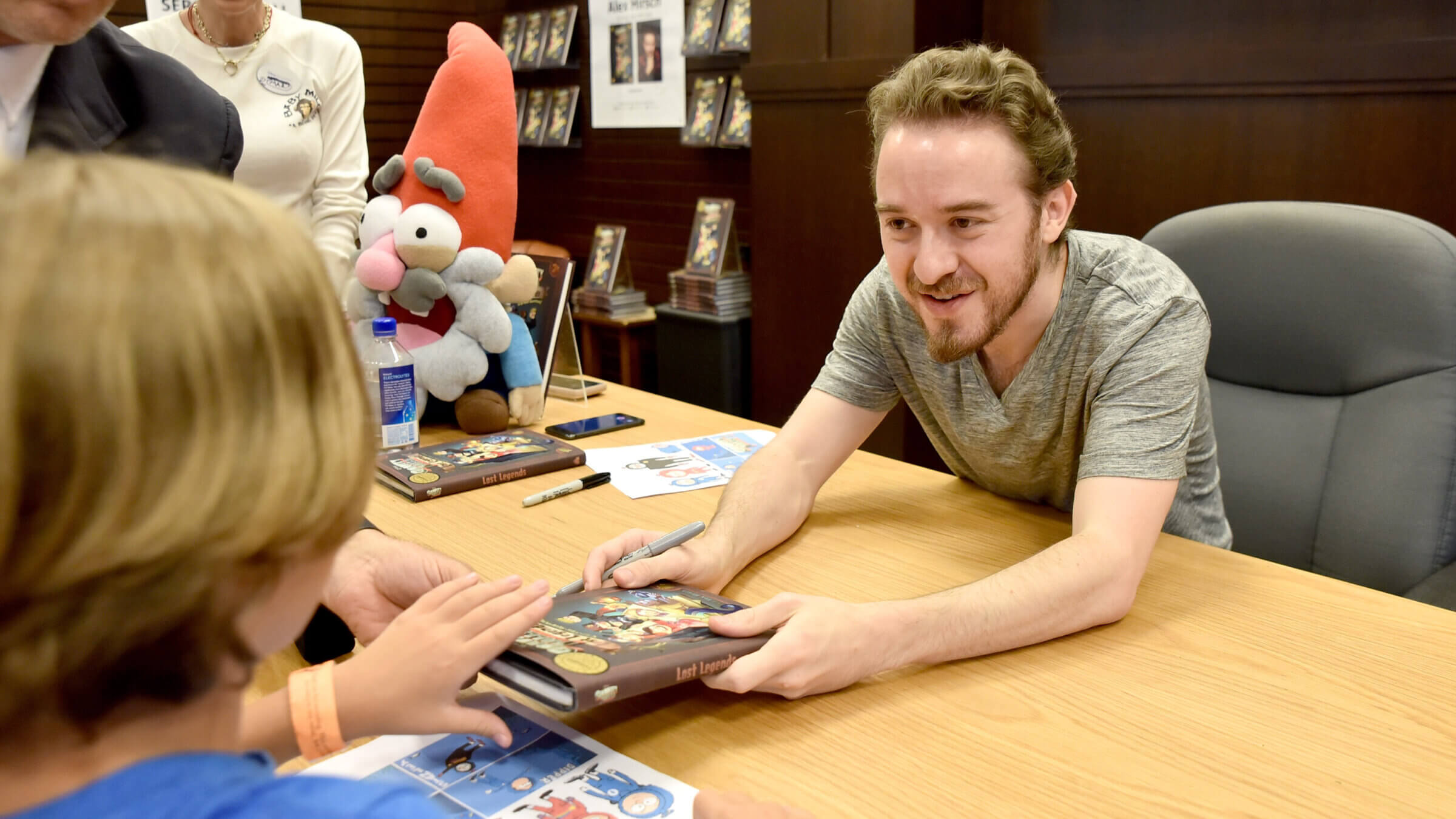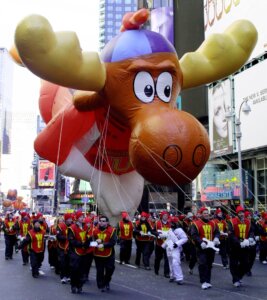Why we need ‘Gravity Falls’ more than ever
The animated series concluded eight years ago, but for some, it will live on forever — like the Kabbalah

“Gravity Falls” creator Alex Hirsch signs copies of his book, “Gravity Falls: Lost Legends” in 2018. Photo by Getty Images
It is as hard to explain how a joke works as it is to explain how it is Jewish. Take this one…please. “My wife still misses me.” Pause. “But her aim is getting better.”
What makes a joke work is, partly, a matter of timing. Miss the pause and the audience misses the joke. Not just one audience, but any number of audiences in any number of places. Even if you put yourself in a dilapidated dinghy from which you accost other boaters on the middle of a lake and tell the joke, if you miss the beat, the odds are no one will laugh.
The odds are greater they will not laugh if you explain why they should: “You see, it’s funny because marriage is terrible.” The odds become yet greater no one will laugh if everyone, including the hapless jokester, are residents of a fictional town in Oregon named Gravity Falls.
You see, this makes it funny. And Jewish, which is less a case of getting the timing right than getting it so terribly wrong.
“Gravity Falls” is the title not for a Richard Russo or Ann Beattie novel — much less Thomas Pynchon’s sequel to his epic laff riot, “Gravity’s Rainbow” — but instead for Alex Hirsch’s remarkable animated television series. It burst into being 10 years ago and blazed for just two short years. Much to the dismay of Disney suits — the show topped the ratings for its cartoon channel — as well as “Falls” fans, Hirsch decided that he had told the story he wanted to tell and brought it to an end.
The show follows the adventures of the Pines twins, 12-year-old Dipper and Mabel, packed off by parents we never see to spend the summer with a great uncle, or Grunkle, they never knew: Stanley Pines. Slovenly and shifty, Stan is a shameless shyster. He lives in a roadside dump that doubles as tourist trap called The Mystery Shack, where he throws wool over the eyes of visitors with exhibits of fantastic fauna he has pasted together — the Jackalope or Sascrotch — then fleeces them in his souvenir shop.
He is inevitably lovable; this is, after all, a kid’s cartoon. But he is also persistently louche because this is, as well, a special kind of kid’s cartoon. According to my 17-year-old Louisa, with whom I’ve watched (more than once) all the episodes and who is a proud owner of a Dipper cap (yes, Gravity Falls has its own virtual souvenir shop), the show is “meta” — a four-letter word for self-awareness served with a dollop of irony.
But long before Bojack and Bart, Beevis and Butthead, meta was, if not betta, at least as good in a place called Frostbite Falls. This was the place where Rocky Squirrel and Bullwinkle Moose first sprung. Yes, the same Bullwinkle who, when another character told him “Let me be frank,” replied “And let me be Bullwinkle.”
Six years old and glued to the rabbit-eared set every Saturday morning for the “Adventures of Rocky, Bullwinkle and Friends,” I don’t think I got the joke. But I did get, at least, the visual joke of a talking squirrel and moose. Also, I got there was something more at work, something I couldn’t grasp, but my parents could. Why else would they laugh at what I thought were the wrong moments?
Looking back, I relished the voices and slapstick, but my mom cherished the dialogue. How could she not? Take “Goof Gas,” where the Pottsylvanian spies, Boris Badenov and Natasha Fatale, debate whether to spray the gas into the Senate chamber, turning its members into goofballs. After listening to the speeches — one senator demands that “We get government out of government!” while another lambastes sending foreign aid “to places like Hawaii and Alaska” — Boris and Natasha conclude that goof gas would be redundant.
The distance between Gravity Falls and Frostbite Falls is not all that great. Rocky and Bullwinkle, as well as the iconic “George of the Jungle,” was the brainchild of Jay Ward. Like Alex Hirsch, Ward was born in California to a Jewish father and gentile mother and eventually dropped his paternal last name Cohen. While Ward did not make much of this background, Hirsch has. Sort of. In a tweet a few years ago, he remarked that Uncle Stan was raised Jewish but became an atheist.

But the show’s Jewish sensibility seems to be a topic of interest in “Gravity Falls” fandom. It certainly is for Louisa — who also happens to have a Jewish father and gentile mother — who finds something Jewish in the show’s attraction for the awkward and the marginal, the outsider and the other. All the more so when, still a child and still Jewish, you find yourself flung into a place like Gravity Falls, as alien and goyish as the YMCA camp buried in the Poconos where I was banished one summer.
Of course, there is something clearly Jewish in episodes like “Dipper vs Manliness.” Mortally embarrassed when Stan catches him, wrapped only in a towel and singing along to Abba’s “Dancing Queen” in the bathroom mirror, Dipper decides to become a man. His guide is a “minotaur” named Chutzpar — sporting a red yarmulke between his horns and a carpet of back hair — who takes him to the Man Cave for his initiation. (Predictably, by episode’s end, Dipper learns that showing compassion for the weak, and not breaking boulders over one’s head, is the manliest of traits.)
But this is too obvious a clue for a show that prides itself on the complexity of the clues Dipper and Mabel confront in their quest to discover the reason for the weird happenings that keep occurring in Gravity Falls. Their guide is a three-volume journal, filled with puzzling warnings and cryptic answers that, volume by volume, Dipper discovers and deciphers. As Dipper masters these gnostic texts, Gravity Falls edges toward an apocalypse called Weirdmageddon to which the journals alone hold the key.
Though not so obvious as a minotaur wearing a red yarmulke or the arch-villain Bill Cipher’s channeling of Don Rickles, there is something Jewish going on here. It is not just Dipper’s attachment to the written word, but to the ethical, nearly eschatological significance carried by words, a focus that seems not just Talmudic, but a tad Kabbalistic. The observation made by Gershom Scholem, the trail-blazing scholar of Jewish mysticism, that the letters of the Hebrew alphabet have “secret, magical power” is equally apt for the letters and ciphers in Dipper’s journals.
Yet more apt, though, is the ethical angle shared by both these worlds. Just as the Kabbalah emphasizes the role that all of us must play to repair a broken world, so too must Hirsch’s motley crew join one another to set straight a “weirded” world. As Gravity Falls is coming undone in the show’s final episode, the only way to recover the shards and remake it is as a group. Given the personal antipathies coursing through the group, this is easier said than done, but done it is. (Or nearly, but that is another story.)
Yet Scholem might well point to a crucial difference. At the end of the day, the Kabbalah seeks, quite literally, the end of the day. The Kabbalist keens, Scholem notes, for the “restoration of the ideal order, which forms the original aim of creation.” Given the violent reality of Jewish life in early modern Europe, this embrace of the ideal makes sense.
But less so in postmodern Gravity Falls. At the end of the final season, the denizens of Gravity Falls are not so immodest to seek the restoration of the ideal order. Instead, all they wish for is the restoration of their wildly un-ideal order. An order that makes room enough even for ganifs like Stan, who sagely notes that “when life gives you lemons, call ’em yellow oranges and sell ’em for double the price.”





















